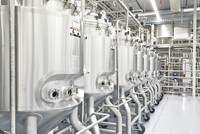Advertisement
Grab your lab coat. Let's get started
Welcome!
Welcome!
Create an account below to get 6 C&EN articles per month, receive newsletters and more - all free.
It seems this is your first time logging in online. Please enter the following information to continue.
As an ACS member you automatically get access to this site. All we need is few more details to create your reading experience.
Not you? Sign in with a different account.
Not you? Sign in with a different account.
ERROR 1
ERROR 1
ERROR 2
ERROR 2
ERROR 2
ERROR 2
ERROR 2
Password and Confirm password must match.
If you have an ACS member number, please enter it here so we can link this account to your membership. (optional)
ERROR 2
ACS values your privacy. By submitting your information, you are gaining access to C&EN and subscribing to our weekly newsletter. We use the information you provide to make your reading experience better, and we will never sell your data to third party members.
Business
Modern Meadow, developer of lab-grown leather, raises $40 million
The start-up will use the funds to scale up their process, which derives collagen from modified cells
by Melody M. Bomgardner
July 4, 2016
| A version of this story appeared in
Volume 94, Issue 27
Brooklyn-based start-up Modern Meadow, which gained notoriety with its capability to grow meat in the lab, has raised $40 million to pursue a different material: leather. The funding round was led by Horizons Ventures and Iconiq Capital.

Modern Meadow calls its product “biofabricated leather.” The firm says its scientists have genetically engineered cells to produce collagen—the key component of animal hide—in varying types and quantities.
Making collagen is just one step of the process, says Modern Meadow Chief Technology Officer David Williamson. “Another important part is the organization of the collagen into the finished product—the remarkable biocomposite of protein and chemicals that make leather.”
The firm’s design ability means it can make new types of leather, such as a hide that is much thinner than one from a cow. And the company claims its leather-making process is up to 80% less wasteful and requires less chemical processing. Forgacs says the company will use the funds to scale up its cell-culture technology and supply samples to customers.
But the firm has its skeptics. “There’s no clear value proposition for what Modern Meadow is doing,” says Jennie Lynch, research associate at Lux Research.
“At best, the market for this material is incredibly niche and not large enough to justify the costs,” Lynch says.





Join the conversation
Contact the reporter
Submit a Letter to the Editor for publication
Engage with us on Twitter